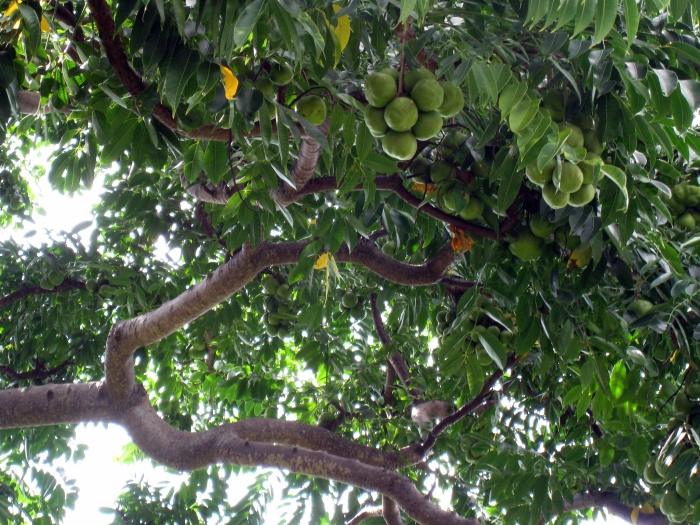June Plum
(Spondias dulcis)
June Plum (Spondias dulcis)
/
/

Wendy Cutler
CC BY 2.0
Image By:
Wendy Cutler
Recorded By:
Copyright:
CC BY 2.0
Copyright Notice:
Photo by: Wendy Cutler | License Type: CC BY 2.0 | License URL: https://creativecommons.org/licenses/by-sa/2.0/ | Uploader: wlcutler | Publisher: Flickr |




































Estimated Native Range
Summary
Spondias dulcis, commonly known as June Plum or Ambarella, is a semi-deciduous tree native to Melanesia and Polynesia, and also found in the tropical Pacific Islands. It can grow to a height of 40-50 feet (12-15 meters) and a width of 15-25 feet (5-8 meters). The tree has a spreading habit with a rounded canopy. It produces small, inconspicuous white flowers followed by large, oval, edible fruits that are green when young, turning to a golden-yellow as they ripen. The fruiting season varies depending on the climate but typically occurs once the tree is established and several years old.
June Plum is valued for its fast growth and the edible fruit it produces, which is rich in vitamin C and can be eaten raw or used in a variety of culinary dishes. It is often grown in tropical and subtropical gardens for its fruit, as well as for shade and ornamental purposes. The tree requires full sun for optimal fruit production and can tolerate a range of soil types, provided they are well-draining. It is drought-tolerant once established but benefits from regular watering during dry periods. While generally pest-resistant, it can be susceptible to fruit flies and fungal diseases in certain conditions.CC BY-SA 4.0
June Plum is valued for its fast growth and the edible fruit it produces, which is rich in vitamin C and can be eaten raw or used in a variety of culinary dishes. It is often grown in tropical and subtropical gardens for its fruit, as well as for shade and ornamental purposes. The tree requires full sun for optimal fruit production and can tolerate a range of soil types, provided they are well-draining. It is drought-tolerant once established but benefits from regular watering during dry periods. While generally pest-resistant, it can be susceptible to fruit flies and fungal diseases in certain conditions.CC BY-SA 4.0
Plant Description
- Plant Type: Tree
- Height: 40-50 feet
- Width: 15-25 feet
- Growth Rate: Rapid
- Flower Color: N/A
- Flowering Season: Spring, Summer
- Leaf Retention: Deciduous
Growth Requirements
- Sun: Full Sun
- Water: Low, Medium
- Drainage: Slow, Medium, Fast
Common Uses
Edible*Disclaimer: Easyscape's listed plant edibility is for informational use. Always verify the safety and proper identification of any plant before consumption., Low Maintenance
Natural Habitat
Native to Melanesia and Polynesia, and also found in the tropical Pacific Islands
Other Names
Common Names: Golden Apple, Ambarella, Pommecythere, Cythere
Scientific Names: , Spondias cytherea, Spondias dulcis, Spondias acida, Spondias cythera, Spondias dulcis var. dulcis, Spondias dulcis var. mucroserrata, Spondias longifolia, Evia acida, Chrysomelon pomiferum
GBIF Accepted Name: Spondias dulcis Sol. ex G.Forst.